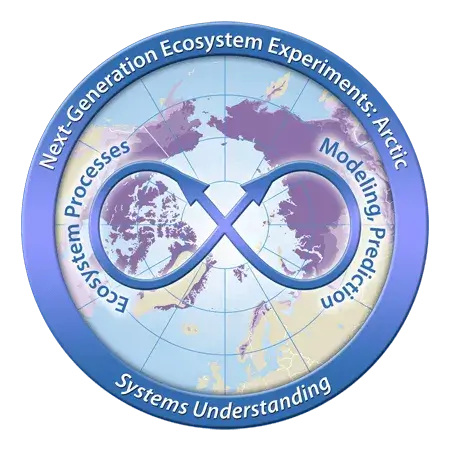Chen, Hongmei, et al. “Molecular Insights into Arctic Soil Organic Matter Degradation under Warming”. Environmental Science & Technology, vol. 52, no. 8, 2018, pp. 4555-64, https://doi.org/10.1021/acs.est.7b05469.
Publications
Displaying 21 - 40 of 41
By year of publication, then alphabetical by title
- Bjorkman, Anne D., et al. “Plant Functional Trait Change across a Warming Tundra Biome”. Nature, vol. 562, no. 7725, 2018, pp. 57-62, https://doi.org/10.1038/s41586-018-0563-7.
- Vaughn, Lydia J. S., and Margaret S. Torn. “Radiocarbon Measurements of Ecosystem Respiration and Soil Pore-Space Carbon Dioxide in Utqiaġvik (Barrow), Alaska”. Earth System Science Data, vol. 10, no. 4, 2018, pp. 1943-57, https://doi.org/10.5194/essd-10-1943-2018.
- Lara, Mark J., et al. “Reduced Arctic Tundra Productivity Linked With Landform and Climate Change Interactions”. Scientific Reports, vol. 8, no. 1, 2018, https://doi.org/10.1038/s41598-018-20692-8.
- Tran, Anh Phuong, et al. “Spatial and Temporal Variations of Thaw Layer Thickness and Its Controlling Factors Identified Using Time-Lapse Electrical Resistivity Tomography and Hydro-Thermal Modeling”. Journal of Hydrology, vol. 561, 2018, pp. 751-63, https://doi.org/10.1016/j.jhydrol.2018.04.028.
- Lombardozzi, Danica L., et al. “Triose Phosphate Limitation in Photosynthesis Models Reduces Leaf Photosynthesis and Global Terrestrial Carbon Storage”. Environmental Research Letters, vol. 13, no. 7, 2018, p. 074025, https://doi.org/10.1088/1748-9326/aacf68.
- Lara, Mark J., et al. “Tundra Landform and Vegetation Productivity Trend Maps for the Arctic Coastal Plain of Northern Alaska”. Scientific Data, vol. 5, 2018, p. 180058, https://doi.org/10.1038/sdata.2018.58.
- Mekonnen, Zelalem A., et al. “Twenty-First Century Tundra Shrubification Could Enhance Net Carbon Uptake of North America Arctic Tundra under an RCP_8.5 Climate Trajectory”. Environmental Research Letters, vol. 13, no. 5, 2018, p. 054029, https://doi.org/10.1088/1748-9326/aabf28.
- Langford, Zachary, et al. “Wildfire Mapping in Interior Alaska Using Deep Neural Networks on Imbalanced Datasets”. 2018 IEEE International Conference on Data Mining Workshops (ICDMW), IEEE, 2018, https://doi.org/10.1109/icdmw.2018.00116.
- Tang, Jinyun Y., and William J. Riley. “A Total Quasi-Steady-State Formulation of Substrate Uptake Kinetics in Complex Networks and an Example Application to Microbial Litter Decomposition”. Biogeosciences, vol. 10, no. 12, 2013, pp. 8329-51, https://doi.org/10.5194/bg-10-8329-201310.5194/bg-10-8329-2013-supplement.
- Skurikhin, Alexei N., et al. “Arctic Tundra Ice-Wedge Landscape Characterization by Active Contours Without Edges and Structural Analysis Using High-Resolution Satellite Imagery”. Remote Sensing Letters, vol. 4, no. 11, 2013, pp. 1077-86, https://doi.org/10.1080/2150704X.2013.840404.
- Dafflon, Baptiste, et al. “Electrical Conductivity Imaging of Active Layer and Permafrost in an Arctic Ecosystem, through Advanced Inversion of Electromagnetic Induction Data”. Vadose Zone Journal, vol. 12, no. 4, 2013, https://doi.org/10.2136/vzj2012.0161.
- Cunningham, Philip, et al. “Large-Eddy Simulations of Air Flow and Turbulence Within and Around Low-Aspect-Ratio Cylindrical Open-Top Chambers”. Journal of Applied Meteorology and Climatology, vol. 52, no. 8, 2013, pp. 1716-37, https://doi.org/10.1175/JAMC-D-12-041.1.
- Painter, Scott L., et al. “Modeling Challenges for Predicting Hydrologic Response to Degrading Permafrost”. Hydrogeology Journal, vol. 21, no. 1, 2013, pp. 221-4, https://doi.org/10.1007/s10040-012-0917-4.
- Frampton, Andrew, et al. “Permafrost Degradation and Subsurface-Flow Changes Caused by Surface Warming Trends”. Hydrogeology Journal, vol. 21, no. 1, 2013, pp. 271-80, https://doi.org/10.1007/s10040-012-0938-z.
- Hinzman, Larry D., et al. “Preface: Hydrogeology of Cold Regions”. Hydrogeology Journal, vol. 21, no. 1, 2013, pp. 1-4, https://doi.org/10.1007/s10040-012-0943-2.
- Hubbard, Susan S., et al. “Quantifying and Relating Land-Surface and Subsurface Variability in Permafrost Environments Using LiDAR and Surface Geophysical Datasets”. Hydrogeology Journal, vol. 21, no. 1, 2013, pp. 149-6, https://doi.org/10.1007/s10040-012-0939-y.
- Wu, Yuxin, et al. “Remote Monitoring of freeze–thaw Transitions in Arctic Soils Using the Complex Resistivity Method”. Vadose Zone Journal, vol. 12, no. 1, 2013, https://doi.org/10.2136/vzj2012.0062.
- Hoffman, Forrest M., et al. “Representativeness-Based Sampling Network Design for the State of Alaska”. Landscape Ecology, vol. 28, no. 8, 2013, pp. 1567-86, https://doi.org/10.1007/s10980-013-9902-0.
- Hinzman, Larry D., et al. “Trajectory of the Arctic As an Integrated System”. Ecological Applications, vol. 23, no. 8, 2013, pp. 1837-68, https://doi.org/10.1890/11-1498.1.

